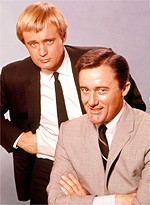 Question:
Who was that gorgeous Russian actor in The Man from U.N.C.L.E.? Not Napoleon,
the other man. Thanks, hon. — Jocelyn V., Valley Forge, Pa.
Question:
Who was that gorgeous Russian actor in The Man from U.N.C.L.E.? Not Napoleon,
the other man. Thanks, hon. — Jocelyn V., Valley Forge, Pa. TV Guide Online [Ask the Televisionary] October, 2001
 Question:
Who was that gorgeous Russian actor in The Man from U.N.C.L.E.? Not Napoleon,
the other man. Thanks, hon. — Jocelyn V., Valley Forge, Pa.
Question:
Who was that gorgeous Russian actor in The Man from U.N.C.L.E.? Not Napoleon,
the other man. Thanks, hon. — Jocelyn V., Valley Forge, Pa.
Televisionary: You're quite welcome, hon. And let me point out that while it was only Scottish actor David McCallum's character, U.N.C.L.E. agent Ilya Kuryakin, who was Russian, McCallum would most likely accept "gorgeous" over some of the other adjectives love-struck women came up with at the time.
Take, for example, the word "cute," a favorite of fan magazines during the tongue-in-cheek spy series's 1964-68 run on NBC. "That's an American word I hate," McCallum, who played opposite Robert Vaughn's American agent, Napoleon Solo, told TV Guide in 1966. "A litter of mongrel puppies is cute."
Of course, the actor didn't have much say over how his female fans — and there were a lot of them — treated him and neither did his wife, actress Jill Ireland. Still, the girls tried to be polite about it. On a promotional tour stop in Dallas, McCallum, Ireland and an MGM publicist were waylaid by a mob of 50 or so screaming fans, who quickly pinned the actor up against the wall. "Do you mind?" one of them asked the Mrs. before planting a big one on her hubby. "It's disquieting — that's what it is," McCallum said of the fuss made over him. "With my Calvinist background and my deep Presbyterian blood, with my stiff Scottish spine, to be told you're suddenly a 'sex symbol' — it's just disquieting."
Perhaps, but that didn't stop the flow of love letters to the network and producers. "Your wild haircut reminds me of an intellectual Beatle," a Chicago teen wrote. (So John Lennon was a philistine?) "Please, no more kissing," three Wellesley students wrote after McCallum put actress Susan Oliver into a liplock. "You will destroy your image with us." The oddest of all, of course, came from a young lady in Los Angeles (where freaks like me live): "Does D. McCallum have any toes?" she asked. (What, he's a muppet or something?) "If so, please send me two pictures of them."
On the other side of the gender gap, a boy of indeterminate age had something more cloak-and-daggeresque on his mind. "Dear Mr. McCallum," he wrote. "Could you please send me a quarter of a pound of explosives?"
All of the above came as a complete surprise to executive producer Norman Felton, who also worked on Dr. Kildare, The U.S. Steel Hour and Mr. Novak. "I never had any idea he would become the hit he has," Felton admitted. "His part in the pilot film was only a few lines, and he was just one of many actors we considered. We picked him because he looked different."
That was just one of the unintended consequences of the show's popularity. There were also the career hopes spawned by the joke message placed at the end of each episode: "We wish to thank the United Network Command for Law and Enforcement, without whose cooperation this program would not have been possible." The producers went so far as to draw up a legal charter for the fictional, shadowy organization and then print business cards for those who worked on the show and NBC affilate employees. Then agent wannabes started contacting the United Nations.
"It's the U.N. in the title that gets them," a spokesman for the U.N.'s Public Information Service told TV Guide. "And when they hear that bit of hokum that the show would not have been possible without the help of U.N.C.L.E., they are sure we are tied up with it." Most of the inquiries came from teens, he said, but adults who wanted to work for U.N.C.L.E., a name series co-creator Sam Rolfe came up with as a "funny designation," were the ones who were hardest to get rid of. "One guy was so intent on becoming a secret agent that we suggested he get in touch with Interpol. I don't know what they told him."